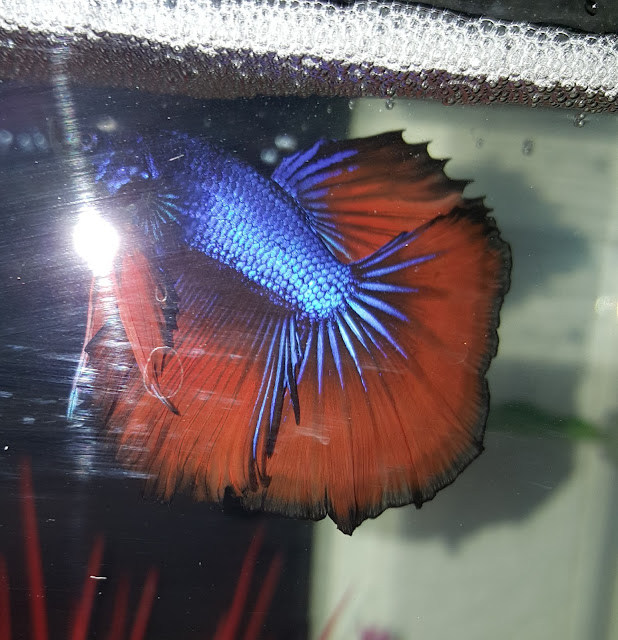Really??????
With how bad Grim looked when I got him, it's nothing short of a miracle that he's alive and thriving. It's incredible how well he's responded to treatment.
His fin rot is improving, he's got new growth, and life is going swimmingly.
His fin rot is improving, he's got new growth, and life is going swimmingly.
Aaaaannndddd in other news...
Ugh!!!
Seriously, I think I invented a whole new class of swear words. I was impressed with myself.
And honestly, it's my own fault. With everything else he's been dealing with, of course he'd most likely have velvet, too. I should've checked for it from the beginning.
Alright, so you see that gold dust on the bottom of his stomach, his anal fin (the long fin at the bottom of his body, ending just before his main causal/tail fin. His anal fin has a big, lovely splash of red), and around his mouth and gills? That stuff that looks like rust-colored glitter?
That's velvet.
Velvet sucks. It's a parasite that attaches itself to the fish, going after the gills first. Once it's attached, it'll drill a little hole into the fish's flesh, destroying cells and feeding on the nutrients of the cells. It fucks with the fish's slime coat, the protective layer on its skin, and makes it unable to balance the chemicals in its body and its environment.
It's also hugely contagious, and so easy to spread, even with bettas who are kept in separate tanks. Sharing the tiniest piece of equipment, reaching in to straighten a plant in one tank, then feeding fish in another tank with the same hand, anything. It can spread so fast.
And of course, it can be deadly on its own, but all the tissue damage also opens the fish up to secondary infections that can kill it, as well.
It's usually caused by water that's too cold (which is part of the reason why heaters are so unbelievably important in betta tanks) or dirty water.
And it's a bitch. Especially at this stage. He's had this for God knows how long. And normally, by this point, they're lethargic, they're not eating, and it's pretty tough to get them over it. It's hard to see, you usually need a flashlight to see it, and often, by the time you see it, it's usually too late.
I'm serious, this shit is no joke. And he's got a lot of it.
He never showed any of the classic symptoms, like rubbing against glass, rocks, gravel, and decorations. This is often the most obvious sign, because the fish do this in an effort to scrape the parasites off their bodies. I've never seen Grim do this. He's also very active and has a robust appetite.
So honestly, it never even occurred to me to check for it. I actually only caught this by mistake, in an attempt to photograph the state of his tail. I didn't realize the flash was still on, and when I saw the image, I was stunned to see the velvet.
It makes sense, though. He was in a tiny bowl of unheated, filthy water. It makes sense that he'd have velvet.
But I'm still treating him for fin rot. Mixing medications is a bad idea, so I can't start medication for the velvet yet.
Yay...
Luckily there are ways to help fight velvet without chemicals. Aquarium salt is the fish equivalent of penicillin. It's not a "cure-all," but it's certainly a fantastic "treat-all" when used with common sense. Not only is it great for treating fin rot, but it's also great for treating velvet.
Awesome, so at least there's that. But for velvet this advanced, that's not enough.
Velvet is very sensitive to temperature. Raising the aquarium temp to 85 degrees really affects its ability to reproduce and multiply. So the first thing I did was raise the temp to 85.
Of course, with him being in such a small tank, that can be a problem. With a tiny little 1.5 gallon tank, temperatures can fluctuate. If they do, and drop back down into the danger zone, then the velvet can reproduce and a whole new life cycle will start. So I've got to be so careful when I do the water changes, to make sure that the temperature stays where it's supposed to be.
It also needs light. Velvet only attaches to the fish for one stage of its life. The other stages take place in the water of the aquarium.
When it's in the water, it's obviously not feeding on the fish's cells, so it requires light to make its own food. Blacking out the tank starves it.
So basically, heat, salt, and darkness over a couple of weeks will stop it from being able to reproduce. Hopefully I caught it soon enough that Grim can pull through this, on top of everything else.
But he's survived cold water, starvation, popeye, fin rot, muscle deterioration, respiratory issues, ammonia burn, and everything else. I think his chances for surviving this are pretty good.




Comments
Post a Comment